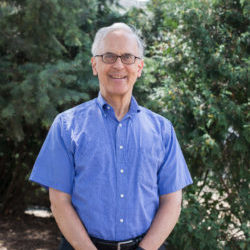Mentored by Jesus to Mentor Others: Part 1

Think about it: Where would you be if you did not have others wiser and more experienced who came alongside to encourage and help you navigate the challenging waters of life, work, and leadership?
If we reflect upon those who have guided and supported us, we will likely discover that there have been more significant people than we realize. While we might not have called these people mentors, they prepared us for and helped sustain us for the work God has called us to do. Pause for a moment and reflect upon these guides: What qualities did they possess that were particularly helpful to you?
Jesus: A Model Mentor
Hopefully, Jesus has also been a model for your life, work, and leadership. The Gospels vividly illustrate how he dealt with many of the dynamics that we face today. Jesus understood that he couldn’t do everything by himself and called disciples and other believers to assist in spreading the good news of the Kingdom of God. One of his common practices was to come alongside a person or group of people and walk with them. Much of the gospel can be seen through the eyes of this “with-ness.”
The term “mentor” was not used in biblical times, but Jesus demonstrated the principles and practices of mentoring. Let’s explore one example of how he lived this out. But first a definition of what it is.
I conceptualize mentoring as coming alongside an individual or group of individuals to learn a skill, develop an ability, or deepen some experience of life. Notice that mentoring is not just a one-on-one relationship.
Mentoring on the Road to Emmaus
The best model of Jesus’ mentoring is recorded in Luke 24:13–35 when he accompanied the two disciples on the road to Emmaus on Easter evening. What did Jesus do and how did he seek to resolve their grief and confusion? The following principles are not meant to be exhaustive but to stimulate our imagination as we seek to learn from our Master.
 Central to this process, Jesus began where these two disciples were (v. 15). Context is always essential. Jesus allowed them to set the agenda and so he inquired about their downcast faces. Mentors must continually remember that the focus of this relationship is the other person; it’s not about us.
Central to this process, Jesus began where these two disciples were (v. 15). Context is always essential. Jesus allowed them to set the agenda and so he inquired about their downcast faces. Mentors must continually remember that the focus of this relationship is the other person; it’s not about us.
Desiring more information, not so much for himself but for their benefit to articulate their need, Jesus asked an open-ended question, “What are you discussing together as you walk along?” (v. 17). Cleopas and his companion were shocked that Jesus wasn’t aware of what had occurred recently in Jerusalem.

Christ again asked a question about what things had happened (v. 19). This provided the freedom for the two grief-stricken followers to pour out their hearts and summarize the main points of Jesus’ arrest and crucifixion. Recognize that as Jesus listened to them, he didn’t instantly reveal his identity. That would have short-circuited the process and failed to accomplish what these disciples needed to learn. This instructs us that mentoring takes time, and it can’t be rushed.
As he continued to listen carefully, Jesus rebuked their misunderstanding (vv. 25, 26). He identified the barrier to their confusion, that the Messiah needed to suffer (v. 26). Anyone on a journey is sooner or later going to get stuck. These barriers can be cognitive, emotional, spiritual, relational, or behavioral. Jesus recounted the stories of salvation using the Scriptures about Moses and the prophets and how they pointed to him to correct their distorted understanding (v. 27).
 The two disciples eagerly received Jesus’ teaching and later reported that their hearts were aflame as he opened the Scriptures to them (v. 32). Cleopas and his friend were hooked and begged Jesus to join them for dinner rather than continue his travels (vv. 28ff.). Jesus, initially welcomed as guest, now became the host. As he broke bread and gave it to them, they immediately recognized his identity. The text is silent on this point, but perhaps his extended arms clearly revealed the nail prints in his hands.
The two disciples eagerly received Jesus’ teaching and later reported that their hearts were aflame as he opened the Scriptures to them (v. 32). Cleopas and his friend were hooked and begged Jesus to join them for dinner rather than continue his travels (vv. 28ff.). Jesus, initially welcomed as guest, now became the host. As he broke bread and gave it to them, they immediately recognized his identity. The text is silent on this point, but perhaps his extended arms clearly revealed the nail prints in his hands.
But that is not the end of the story or the process of mentoring. Jesus prepared his disciples to continue their journey without him (v. 33). No sooner did they understand that he was their beloved Messiah that he disappeared from their sight. Christ’s mission was accomplished, and they now had to live out the truth of the resurrection and tell the other disciples. It is also a reminder that mentors need to be alert and not allow the mentee to become dependent upon them and fail to develop their own abilities.
In Part 2 of this series, I will unpack three key principles of mentoring that we can learn from this biblical foundation.
About the Author
Rev. Tom Schwanda (DMin, Fuller; PhD, Durham University, UK), is associate professor of Christian Formation and Ministry, emeritus, Wheaton College and adjunct associate professor in Christian spirituality at Fuller where he regularly teaches a DMin course on mentoring.
Banner image by Chris Leggat on Unsplash.

Tom Schwanda
Author & Guest
Tom is a Reformed Church in America minister, who spent 18 years serving three different congregations. He taught a variety of courses related to Christian spirituality, including spiritual theology, discipleship, reading Scripture, and worship at Kuyper College (Grand Rapids) and Wheaton Co...


